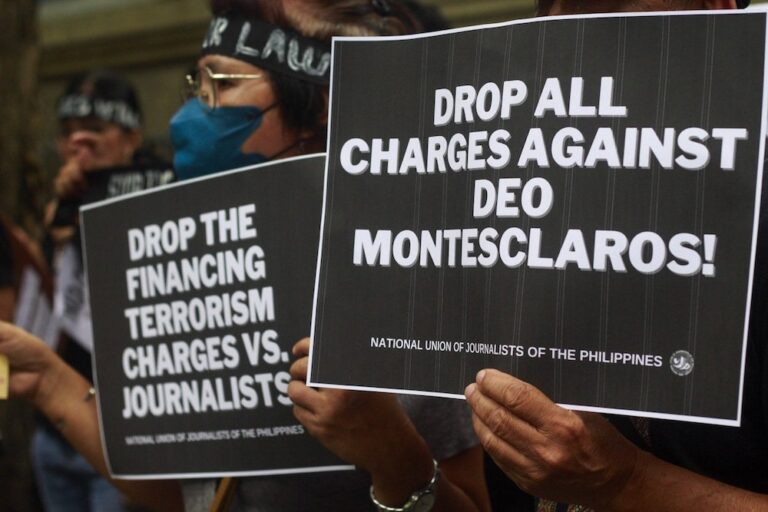(SEAPA/IFEX) – On 4 May 2006, the Philippine Supreme Court rejected President Gloria Macapagal Arroyo’s pretenses for declaring a “state of emergency” in the country in February, and declared, among other things, that the ensuing raid on a newspaper and the threat of sedition charges against the media constituted prior restraint on the press and […]
(SEAPA/IFEX) – On 4 May 2006, the Philippine Supreme Court rejected President Gloria Macapagal Arroyo’s pretenses for declaring a “state of emergency” in the country in February, and declared, among other things, that the ensuing raid on a newspaper and the threat of sedition charges against the media constituted prior restraint on the press and a violation of the Philippine Constitution.
Likening Arroyo’s “state of emergency” to the executive decree that Ferdinand Marcos used to declare martial law in the 1970’s, Philippine Chief Justice Artemio Panganiban said the Arroyo government “may be testing the outer limits of presidential prerogatives and the perseverance of this court in safeguarding the people’s constitutionally enshrined liberty.”
“They are playing with fire and, unless prudently restrained, they may one day wittingly or unwittingly burn down the country,” the chief justice was further quoted by the “Philippine Daily Inquirer”.
Claiming to thwart a coup engineered by colluding rightists and leftists, Arroyo in February declared a “state of emergency” in the Philippines and called on the military to suppress “lawless violence” under a new Presidential Proclamation (PP1017). For one week, PP1017 led to warrant-less arrests, prohibitions against street protests, and at least one raid on a daily newspaper. Activists and oppositionists challenged the proclamation in court.
On 4 May, the Supreme Court likened Ms Arroyo’s PP1017 to Marcos’ Proclamation No. 1081, which imposed martial law in 1972.
“We all know that it was PP1081 that granted President Marcos legislative power. Its enabling clause states: ‘To enforce obedience to all the laws and decrees, orders and regulations promulgated by me personally or upon my direction,'” said the 73-page majority decision penned by Associate Justice Angelina Sandoval-Gutierrez. “The enabling clause of PP1017 issued by President Arroyo is to enforce obedience to all the laws and to all decrees, orders and regulations promulgated by me personally and upon my direction,” it noted. This court rules that the assailed PP1017 is unconstitutional insofar as it grants President Arroyo the authority to promulgate “decrees” and totally ignore Congress.
The decision also stressed that arrests without warrants, attempts to impose standards on media or any form of prior restraint on the press, as well as the raid, without a warrant, of the “Daily Tribune” offices “and the whimsical seizure of its articles for publication and other materials”, were all patently unconstitutional.


